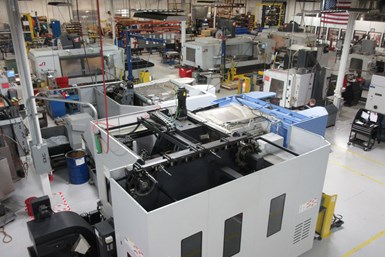4 Advantages of Acquiring Another Machining Business
Opportunities to expand CNC machine shop businesses via acquisition come with advantages that manifest themselves in terms of customers, employees, production technologies and business practices.
Share

Compass Precision LLC is a collection of CNC machining and fabrication shops headquartered in Charlotte, North Carolina (Advanced Machining and Tooling, Douglas Machining Services, Gray Manufacturing Technologies, Quality Products and Machine, and Tri-Tec Industries). Compass places responsibility for running each operating company in the hands of their local managers who are well positioned to use Compass’ resources to serve customers. Compass provides overall direction, just as an actual compass provides direction to travelers.
Photo Credit: Compass Precision LLC
CNC machine shops populate almost every county in this country, while somewhere between 16,000 and 20,000 are scattered across the U.S. The most successful ones have a long history of plowing profits back into buying more equipment and hiring extra staff. Doing this has long been a sign of success.
However, CNC machine shop owners should not overlook opportunities to expand their businesses via acquisition. We all know of someone within the industry ready to step back and retire. Unfortunately, some of these owners lack an heir or lieutenant with the management skills and financial resources needed to take over. These shops typically are either sold or closed.
Enterprising owners of successful shops are logical buyers of shops being sold. Hands-on owners of multiple shops are probably even better candidates, particularly those with the necessary management and financial skills to oversee operations at various locations. Purely financial buyers are also candidates but might be less successful after the purchase due to a lack of industry knowledge.
Buying another shop presents far different challenges to machine shop owners than simply expanding in place. But several significant advantages accrue to owners that pursue this growth avenue. These advantages manifest themselves in terms of customers, employees, production technologies and business practices.
First, acquiring another shop brings with it a new customer base. Getting new customers is hard and usually involves lots of frustrating cold calls, quotations, first articles, process certifications, and often pricing to get the order. But customers of a business being sold will usually stick around. Most continue placing orders with the new owner, assuming price, delivery and shipping location remain unchanged. The odds of this happening get better if the new owner retains the old company’s key employees, especially those with customer contacts.
Second, buying a machine shop usually involves hiring their employees. This can be good or bad, depending on the quality of the seller’s workforce. But one of today’s hottest topics is the difficulty, sometimes extreme difficulty, in hiring qualified manufacturing employees. Some shops openly admit they are turning down business in today’s environment because of their inability to hire enough qualified employees. Acquiring another shop does not solve this problem entirely, but inheriting an experienced workforce can be a whole lot better than building one from scratch.
Third, taking over someone else’s machine shop gives the new owner immediate first-hand knowledge of the acquired shop’s machines, which are likely different from those in the owner’s existing shop. After some experience, the owner may elect to use his/her expanded collection of production machinery in ways not possible before. For example, what if the acquired shop has multitasking mill/turn machines with some available capacity, and the original shop runs certain parts through multiple ops on lathes and vertical mills? There may be an immediate benefit of transferring these parts to the new shop. Sometimes, the possibilities of this “re-sourcing” are not apparent when the acquisition is made but become apparent as the owner gains experience with the new shop’s capabilities and capacities.
Finally, an acquisition can expose the owner to a multitude of new and different business practices. An enterprising owner may learn things potentially benefiting his entire expanded company. In my personal experience with Compass Precision. LLC, we have modified our benefits package, changed certain features of our websites and adjusted our capital spending plans, all resulting from ideas we learned from acquisitions.
Today’s machine shop owner faces a more complex set of decisions concerning how to grow his/her business than ever before. Tried and true organic growth remains a viable option. But growth via acquisition brings unique advantages, namely new customers, employees, machines and different ways of doing business. An enterprising owner might consider a playbook employing both strategies.
To learn more about what Gary Holcomb looks for in a partner for Compass Precision, read Advantages of Partnering with Compass Precision and listen to this episode of the company’s The Right Direction Podcast.
About the Author
Gary Holcomb
Gary Holcomb is president and CEO of Compass Precision, LLC, a Charlotte, North Carolina-based manufacturer of precision CNC machined components, which is growing both organically and via acquisition. Holcomb previously served as CEO of Coining Inc., a precision metal stamping firm. During his seven-year tenure at Coining, the company’s revenues went from $13 million to $65 million from internal growth and acquisition.
Read Next
A Tooling Workshop Worth a Visit
Marubeni Citizen-Cincom’s tooling and accessory workshop offers a chance to learn more about ancillary devices that can boost machining efficiency and capability.
Read More5 Aspects of PMTS I Appreciate
The three-day edition of the 2025 Precision Machining Technology Show kicks off at the start of April. I’ll be there, and here are some reasons why.
Read More











.jpg;maxWidth=300;quality=90)




